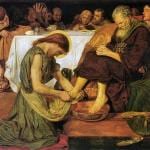
2 Thessalonians 2:15 (RSV) So then, brethren, stand firm and hold to the traditions which you were taught by us, either by word of mouth or by letter.
It’s the fact that Paul is an apostle (and the apostle, according to Protestants) and he is saying, “I have this tradition that I have passed on to you, both in writing and orally. Keep it.” That’s not sola Scriptura, any way you look at it.
So the Protestant who defends Protestantism against us “unbiblical” Catholics will retort: “well, whatever God wanted to be binding He made sure would be inscripturated.” In fact, a guy who goes by “excatholic4christ” made pretty much exactly this unbiblical argument, just yesterday:
It’s true that the Lord Jesus did not commit His teachings to writing during His earthly ministry. He communicated His teachings orally to His apostles and disciples. The apostles and disciples then committed the Gospel accounts of Christ’s ministry and His teachings to writing through the divine inspiration of the Holy Spirit over a span of about forty years, beginning in the late 40s or early 50s and ending in the early 90s. The infant church absolutely depended on the oral teachings of Paul and the other apostles, but as the inspired Gospels and apostolic epistles were written and circulated throughout the church, apostolic oral teaching ended with the deaths of the apostles. God’s Word is the sole authority for Christians and all that we need.
But this argument is self-defeating, because the notion of “inscripturation” is not found anywhere in the Bible. Therefore, it’s merely an extrabiblical tradition of men, which is precisely the thing that the Protestant is excluding by his guiding principle of sola Scriptura.
So it’s a vicious logical circle. You can’t appeal to tradition in order to uphold Scripture Alone. By definition and category distinctions, you must appeal only to Scripture to uphold the notion that only biblical teachings are binding and infallible. If you appeal to a non-biblical tradition to do that, then you are forced to redefine your rule of faith and it’s no longer sola Scriptura as we know and love it.
One can quibble about exactly what teachings Paul was passing along (and which ones he was not), but it’s beyond doubt that he was passing them along, and not by the method of sola Scriptura.
The latter is the Protestant rule of faith or authority, and Paul clearly ain’t following it. He must have flunked out of the Protestant seminary.
***
Related Reading
Dialogue on “Tradition” in the New Testament (vs. Dr. Eric Svendsen) [1996]
Dialogue on “Perspicuous Apostolic Teaching” (vs. James White) [May-June 1996]
“Tradition” Isn’t a Dirty Word [late 90s; rev. 8-16-16]
“Moses’ Seat” & Jesus vs. Sola Scriptura (vs. James White) [12-27-03]
Binding, Authoritative Tradition According to St. Paul [2004]
James White’s Critique of My Book, The Catholic Verses: Part I: The Binding Authority of Tradition [12-30-04]
Biblical Evidence for Apostolic Oral Tradition [2-20-09]
25 Brief Arguments for Binding Catholic Tradition [2009]
Tradition, Succession, Apostolic Deposit (vs. Calvin #25) [7-1-09]
Tradition, Church, & the Rule of Faith (vs. Calvin #27) [7-6-09]
Biblical Evidence for True Apostolic Tradition (vs. “Traditions of Men”) [6-23-11]
Biblical Evidence for the Oral Torah [10-18-11]
Reply to a Lutheran on Tradition & the Patristic Rule of Faith [1-10-12; additions on 2-20-18]
Is Sacred Tradition “Inspired”? No; Only Sacred Scripture Is [10-8-19]
Salesian Apologetics #2: Biblical Apostolic Tradition [2-5-20]
***
(originally 8-28-18 on Facebook)
Photo credit: The Apostle Paul (1631), by Abraham Bloemaert (1564-1651) [public domain / Wikimedia Commons]
***













